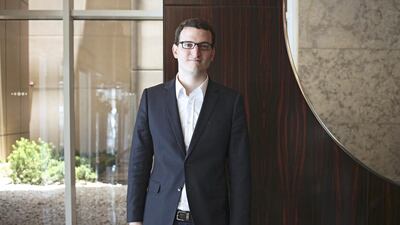PayPal is launching an Arabic version of its mobile app to drive growth of its online payment services in the region. To date the company has registered half a million users across the Middle East and North Africa (Mena) and has secured a 5 per cent share of the region’s e-commerce market.
The mobile application is set to go live in the second to third quarter of this year. PayPal is also looking to set up a customer services base to cater to Arabic users in the Middle East.
“In the region it is more about changing habits and letting people know they have more options,” said Laurent Wakim, the regional manager of Mena at PayPal. “Today in the region the online business is still very small, [but] payments are growing and e-commerce is booming. We are starting with the mobile application – that’s where we see most of the opportunity coming from.”
The region’s e-commerce market is expected to grow to US$15 billion by next year, of that $4.9bn will come from mobile-commerce. The high smartphone penetration in the GCC, particularly in the UAE, will drive mobile-commerce and is the reason PayPal has decided to launch an Arabic mobile app ahead of an Arabic version of its website.
“We are trying to make PayPal local for our customers we will also be announcing more partnerships with banks to bring more features for buyers and merchants and to bring more flexibility to online shopping,” said Mr Wakim.
The combined Mena region joins Russia, India, China and Brazil as the biggest emerging markets for e-commerce growth. Yet despite the opportunities in the Middle East, the market is still small when compared with the others.
One reason for this is the low percentage of businesses that have a presence online. Just 15 per cent of businesses across the region have a website and not all of them have electronic payment gateways.
“We are seeing a lot of initiatives in the Mena region to get businesses active online and that goes for the big corporations and lots of focus for SMEs,” said Abdul Malek Jaber, the chief executive of Middle East Payment Services. “I think the growth will be exponential.”
With the likes of souq.com, Emirates Airline and Etihad Airways now offering payment through PayPal, more businesses are likely to sign up.
A reliance on cash-on-delivery is also one of the biggest obstacles to the growth of the sector, said Mr Wakim, and something that online retailers have complained about. The online electronics retailer JadoPado stopped cash on delivery options in January this year and its founder Omar Kassim said that business has been booming despite this.
PayPal is set to face some stiff competition from MasterCard once the credit card firm launches MasterPass in the region over the next few weeks. MasterPass logs the user’s credit card details and allows them to purchase goods on their mobile phones simply by logging in with their user name and password.
“The payment business is very dynamic around the world. The credit card schemes are now looking at online payments and digital wallets in a different way,” said Mr Wakim. “Competition is good, there won’t be one winner who will take it all.”
thamid@thenational.ae
Follow us on Twitter @Ind_Insights

